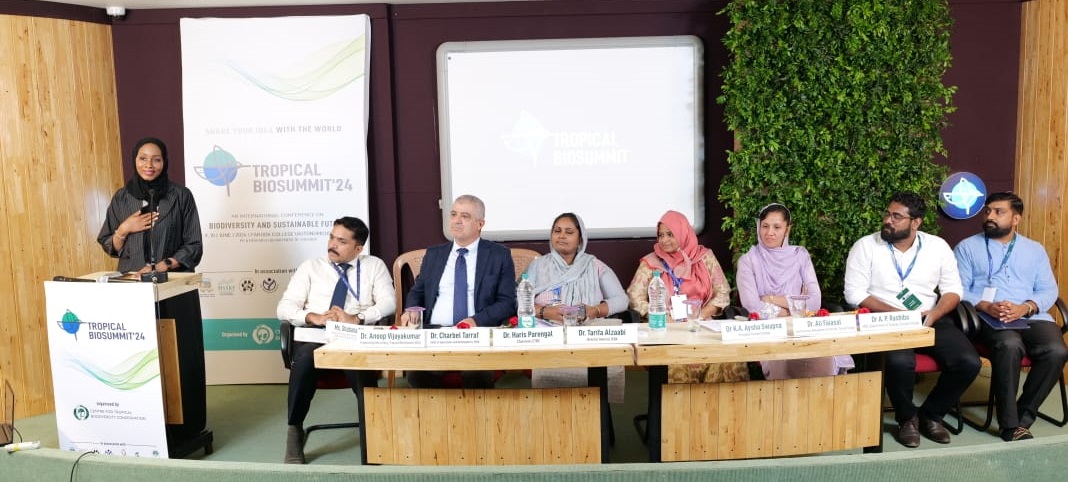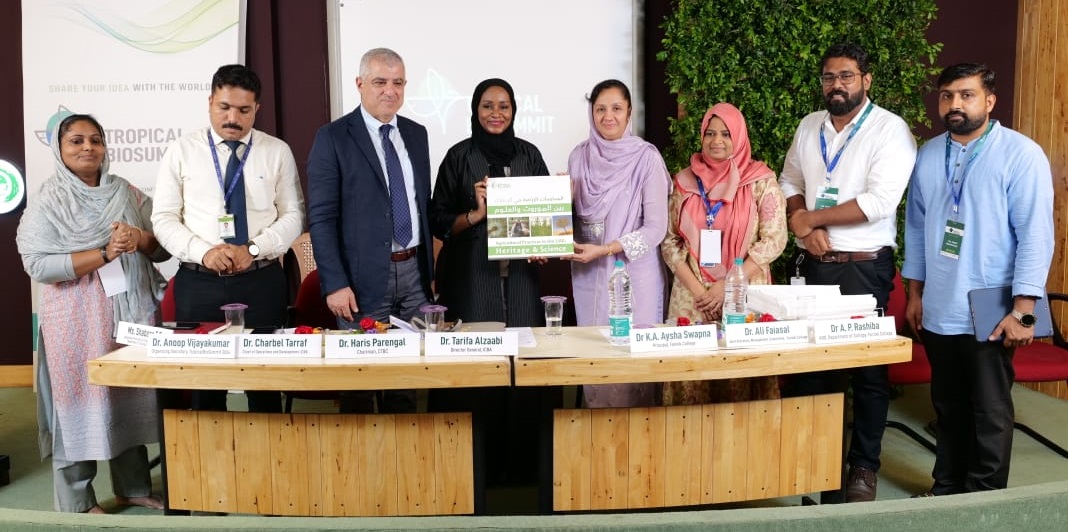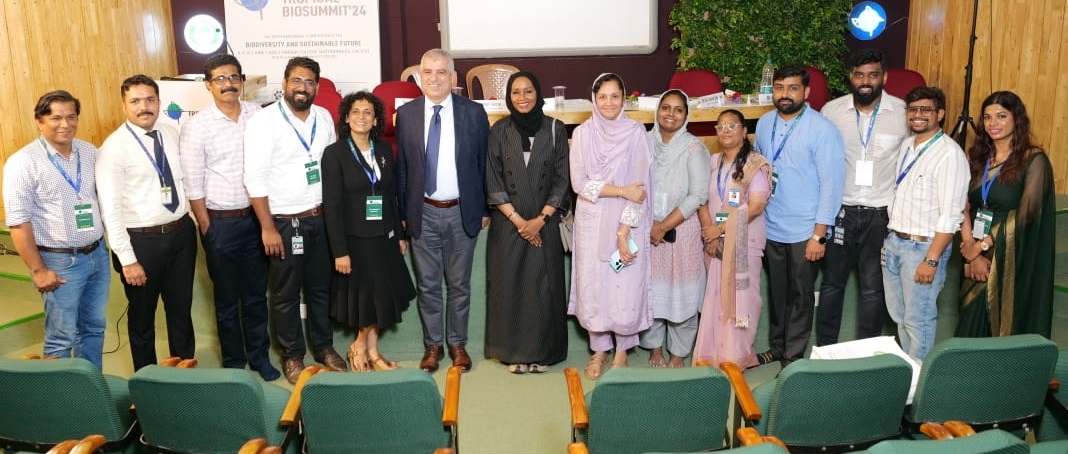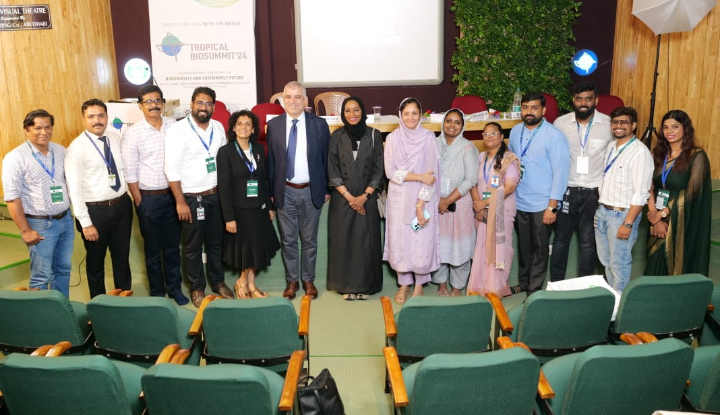Reported on:
2024-06-10
The PG and Research Department of Zoology at Farook College Autonomous in Calicut organized three-day international conference, Tropical BioSummit '24, in collaboration with Centre for Tropical Biodiversity Conservation (CTBC). This summit, focusing on "Biodiversity and Sustainable Future," brought together researchers, scholars, and academicians from around the globe to address urgent contemporary challenges in bioscience and technology. Tropical BioSummit '24 not only provided a platform for sharing cutting-edge research but also fostered collaboration and networking among participants, setting the stage for future advancements in the field of tropical biodiversity and sustainability.
Inaugural Session
The event began with a solemn prayer by Ameena, a postgraduate zoology student, followed by a performance by the college choir. The chief guest, Dr. Tarifa Alzaabi, Director General of the International Center for Biosaline Agriculture (ICBA), United Arab Emirates, inaugurated the summit. Dr. Charbel Tarraf, Chief of Operations and Development at ICBA, facilitated the event. Dr. Alzaabi emphasized the importance of international collaboration in developing sustainable agriculture and ensuring food security in tropical countries.

Other dignitaries present included Dr. Anoop Vijayakumar, Organizing Secretary of Tropical BioSummit 2024; Dr. Haris Parengal, Chairperson of CTBC; Dr. Ali Faisal, Joint Secretary of the Management Committee at Farook College; Dr. K.A. Aysha Swapna, Principal of Farook College; and Rakesh V., DDD at NABARD. Dr.
A. P. Rashiba, Head of the Zoology Department, delivered the welcome address, and Ms. Shabana TP, coordinator of the conference, extended the vote of thanks.

Keynote speakers included:
- Dr. Tarifa Alzaabi: "The Importance of International Collaboration in Developing Sustainable Agriculture and Ensuring Food Security in Tropical Countries"
- Dr. Charbel Tarraf: "The Role of Leadership and Strategic Planning in Enhancing Sustainable Agriculture Practices: A Comparative Analysis of Institutional Approaches in the Middle East and North Africa (MENA) Region"
- Dr. Uma Saxena: Presentation on a critical topic within bioscience.

Every day began with a breakfast session, which followed into the Audio Visual theatre for the firsts of talks and presentations. Along with breakfast, lunch as well as tea breaks were also included in the summit.
Presentations and Cultural Programs
Approximately 12 researchers presented their studies on the first day. The afternoon saw parallel presentation sessions across the other designated venues of UG seminar hall and another hall on the grounds of Farook Training College, covering sessions of workshops on ‘R programming’, ‘GIS’ and ‘Phylogeny’.
The first day concluded with vibrant cultural performances put forth by the students of the dance and music clubs- Steps and Vibez respectively. The final performance of the evening gave way to a detailed picture of the artistic culture of India, covering different dance styles put together in one big finale.
The second day (June 9, 2024) commenced with another round of intellectual engagement, featuring simultaneous sessions of paper presentations, both online and offline, along with the continuation of workshops from the first day. Keynote presentations included:
- Dr. Arun P R: "Environmental Impacts; Challenges and Lessons from Nature"
- Dr. Rajeev Raghavan: "Keep Them Swimming: Securing the Future of South Asia's Freshwater Fishes"
- Dr. Nishith Dharaiya: Presentation on sloth bear range mapping for 2024.
- Dr. Arya Sidharthan: "Exploring the Depths: Citizen Science and Outreach Unveils Kerala’s Groundwater and Subterranean Biodiversity"
- Dr. V. P. Limna Mol: Discussed significant aspects of biodiversity and conservation.
Final Day and Valedictory Function
The final day of the summit began with keynote speeches followed by a symposium. Dr. Joy Scaria delivered an insightful keynote speech, and Dr. Vivek Philip Cyriac gave a talk on "Digging into Evolutionary Time: Diversity and Conservation of Fossorial Shieltail Snakes."
The PAN India symposium on "Pesticides and Biodiversity" was held from 9:45 AM to 12:00 PM. A healthy environment relies on balanced biodiversity, but pesticide use in agriculture, construction, gardening, and household pest control poses significant threats. Pesticides, including insecticides, fungicides, and herbicides, impact non-target species and environmental resources, contributing to water and air pollution. They harm aquatic life, beneficial soil microorganisms, and pollinators like bees, disrupting ecological balance and food chains.
Bioaccumulation in food chains affects animal health and higher trophic levels, decreasing predator populations and destabilizing ecosystems. Pesticides also contribute to climate change, further challenging biodiversity and human survival. The TropicalBioSummit-24 session on "Pesticides and Biodiversity" addressed these issues through technical presentations and discussions.
Presentations continued both online and offline until the tea break at 4:30 PM. About 109 paper presentations were delivered, with 48 offline and 61 online.
Six keynote speakers shared their expertise, followed by lively Q&A sessions. They gave opinions and suggestions to better the works as well as improve their understanding of the subject. With complimentary words and thoughtful comments, the session moved forward with intellectual knowledge gain within everyone present in the audience. Participants from countries such as India, Canada, Zimbabwe, the Philippines, Sri Lanka, Cameroon, Russia, and Nepal enriched our conference with their diverse perspectives. Additionally, representatives from 18 states across India also took part in the event.
The summit concluded with a valedictory function from 4:45 PM to 5:20 PM. CTBC and the Zoology Department of Farook College expressed their gratitude for the successful execution of the event. Best presenters were awarded as follows:
- Best paper (online):
- Mr. Kalpapran Patowary: “Potential Densities of Leopards in Sub-Saharan Africa: Target for Recovery and Informing Current Management”
- Mr. Edgar M. Anud, Jr.: “Distribution of Liverwort Flora Across Vegetation Types in Mt. Bagalbal: A Basis for IEC Material Development”
- Best paper (offline):
- Ms. Amritha Jaiprekash Kurup: “Plankton - The Stewards of Ecological Health: An Analysis of Planktic Morphospecies from Pulicat Lake as Potential Ecoindicators”
- Best poster award:
- Ms. Gopika S. Pillai: “Study of Forest Carbon Dynamics of Idukki District Using Forest Inventory Data”
The Tropical BioSummit '24 marked a significant milestone in advancing biodiversity conservation and sustainable development, fostering a collaborative environment for researchers, students, and professionals. The programconcluded with participants sharing their feedback, capturing memorable and significant photographs. This final segment not only allowed for the expression of personal reflections and insights but also immortalized the experience through the power of photography, ensuring that the event was both commemorated and celebrated in a meaningful way.
